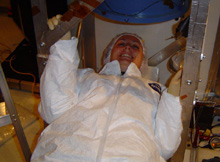 | Monday, August 1, 2005 |
|
Monday, August 1 PARTICLE ASTROPHYSICS SEMINARS WILL RESUME IN THE FALL 3:30 p.m. DIRECTOR'S COFFEE BREAK - 2nd Flr X-Over 4:00 p.m. All Experimenters' Meeting - Curia II Special Topic: CDF Silicon Radiation Damage So Far
Tuesday, August 2 |
|
Extended Forecast |
Secon Level 3 |
|
Monday, August 1 Wisconsin Cheese Soup Corned Beef Reuben $4.85 Stuffed Chicken Breast $3.75 Shepherd's Pie $3.75 Turkey Craisins Wrap $4.85 Meat Lovers Pizza $3.00 Pacific Rim Rice Bowl $4.85 The Wilson Hall Cafe now accepts Visa, Master Card, Discover and American Express at Cash Register #1. |
|
Lunch Wednesday, August 3 Tri-Colored Tortellini Salad Lemon Cheesecake w/Blueberry Sauce
Dinner
Chez Leon Menu |
| Fermilab Today is online at: http://www.fnal.gov/today/ Send comments and suggestions to today@fnal.gov Fermilab Today archive Fermilab Today PDF Version Fermilab Result of the Week archive Fermilab Safety Tip of the Week archive Linear Collider News archive Fermilab Today classifieds Subscribe/Unsubscribe to |
|
CDMS Intern Caputo Studies
Dark Matter, Physics Careers | ||
| ||
|
While many college undergraduates are filling coffee cups and making photocopies
at their summer internships, Regina Caputo is busy searching the skies for dark
matter. Caputo, a fourth-year physics major at the Colorado School of Mines,
is a summer intern with the
Cryogenic Dark Matter Search (CDMS)
team at Fermilab. She is working on the project's event display, writing a computer program that will allow "the rest of the collaboration to go through the data we've acquired."
Now in its second incarnation, CDMS currently has five silicon and germanium detector towers in the Soudan Underground Laboratory in Minnesota, and hopes to build two more towers in the near future. The detectors are cryogenic, cooled to extreme temperatures in refrigerators of liquid helium, which helps the team detect very low energy interactions. Ultimately, CDMS hopes to directly detect Weakly Interacting Massive Particles (WIMPs), the lightest supersymmetric particles thought to exist and a leading candidate for dark matter. "I really enjoy the project," Caputo said. "It's very cutting edge, and directly advances what we know about the universe."
Caputo's internship is organized by the Science Undergraduate Laboratory Internships (SULI) program, which places undergraduate science and engineering majors in internships at DOE facilities across the country. The program aims to introduce students to the realities of physics careers, which have sometimes surprised Caputo. "What they expect you to do here is so much different than what they expect in a classroom," she explained. While she had no prior experience with particle astrophysics, she is considering continuing in the field in graduate school because of her experience with CDMS. "There is so much that we don't know about the universe yet, so it's a very exciting field," she said.
|
|
July 27 - July 29 - During this 48 hour period operation established two store that combined with an existing store provided the experiments with approximately 26 hours and 27 minutes of luminosity - Stores lost due to quench and an inadvertent abort
Read the Current Accelerator Update |
|
From Nature, July 28, 2005 Earthly whispers of geoneutrinos by Amber Jenkins Neutrinos originating from inside the Earth have at last been detected — a landmark discovery that will lead to a deeper understanding of the radioactive make-up of our planet, and of its overall heat budget. Read More |
|
Sting First Aid | ||
| ||
|
Last week's safety tip dealt with avoidance of bee and wasp stings.
This week we cover first aid measures. Most often, symptoms include
sharp pain, swelling, itching and redness at the sting site.
An allergic response, if it occurs, will appear within an hour.
Such reactions tend to be minor, though a head/neck sting can
block an airway through localized swelling. Symptoms that appear over
the entire body signal an anaphylactic reaction that can be deadly
within minutes. Watch for hives, swelling over major body parts,
difficulty breathing, dizziness, fainting, chest pain, racing heartbeat,
nausea, vomiting and diarrhea.
If you had an allergic reaction in the past, you should carry a sting allergy emergency kit (e.g., Epi-Pen). If stung, you should call the Lab's emergency number (X3131) even if you have already used an allergy injection kit. Also, make your coworkers aware of your sensitivity and what they should do if you are stung.
Any Fermilab employee who receives a sting in the course of employment
should at least contact the Medical Department for a consultation (X3232).
General first aid measures include scraping out any left-behind stingers;
use a credit card or fingernail for this. Any squeezing could inject
additional venom. Clean the sting area with soapy water,
then cool the skin with ice cubes or an ice-pack wrapped in a cloth
or thin towel for 15 minutes. Take OTC pain relievers and antihistamines,
as necessary, taking appropriate precautions for drowsiness. Worsening
of local symptoms over a few days suggests infection that requires
medical attention. Watch for pain, increased swelling and redness,
and warmth.
|
|
Air Pollution Action Day Today's conditions are favorable for unhealthy ozone and particulate matter levels. Residents of the Chicago metropolitan area are asked to curb vehicle use, postpone activities that use gasoline powered equipment, conserve energy, and avoid burning wood or yard waste.
SEWS Test on Tuesday
NALWO English Classes
Scottish Country Dancing |

